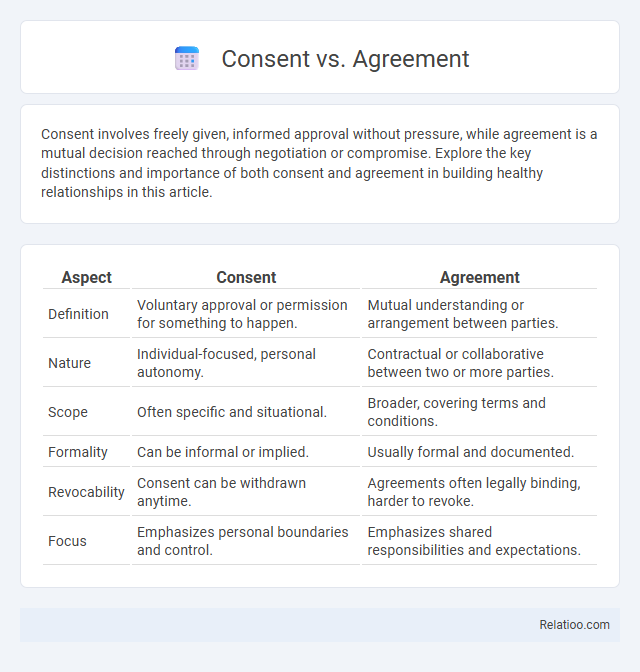Consent involves freely given, informed approval without pressure, while agreement is a mutual decision reached through negotiation or compromise. Explore the key distinctions and importance of both consent and agreement in building healthy relationships in this article.
Table of Comparison
| Aspect | Consent | Agreement |
|---|---|---|
| Definition | Voluntary approval or permission for something to happen. | Mutual understanding or arrangement between parties. |
| Nature | Individual-focused, personal autonomy. | Contractual or collaborative between two or more parties. |
| Scope | Often specific and situational. | Broader, covering terms and conditions. |
| Formality | Can be informal or implied. | Usually formal and documented. |
| Revocability | Consent can be withdrawn anytime. | Agreements often legally binding, harder to revoke. |
| Focus | Emphasizes personal boundaries and control. | Emphasizes shared responsibilities and expectations. |
Understanding Consent and Agreement
Understanding consent involves recognizing it as a clear, voluntary, and informed affirmation, essential in legal and interpersonal contexts. Agreement refers to a mutual arrangement where parties share a common understanding and acceptance of terms, often documented in contracts or negotiations. You must distinguish consent from agreement, as consent emphasizes permission without coercion, while agreement centers on a negotiated compromise or deal.
Key Definitions: Consent vs Agreement
Consent refers to the voluntary and informed permission given by an individual for a specific action, often emphasizing personal autonomy and legal validity. Agreement involves a mutual understanding and acceptance between two or more parties outlining terms, conditions, and obligations, typically forming a contractual relationship. Your clarification of these key definitions is essential for distinguishing personal approval (consent) from negotiated mutual commitments (agreement).
Legal Perspectives on Consent and Agreement
Legal perspectives distinguish consent as a voluntary and informed permission given by an individual, often required to validate actions like medical treatments or contracts. Agreement involves a mutual understanding and acceptance of terms between parties, forming the basis of enforceable contracts under contract law. You must recognize that while consent emphasizes personal autonomy and willingness, agreement centers on the negotiated obligations binding each party legally.
Role of Intent in Consent and Agreement
Consent requires a clear and voluntary intention to permit an action, emphasizing the individual's explicit willingness. Agreement involves a mutual understanding and intent between parties to accept specific terms, highlighting shared intentions to form a binding contract. The role of intent is crucial in consent as it must be informed and freely given, whereas in an agreement, intent solidifies the commitment to negotiated conditions.
Differences in Application: Consent vs Agreement
Consent refers to the voluntary permission given by an individual, often related to personal rights, medical procedures, or data privacy, emphasizing awareness and willingness. Agreement is a broader concept involving mutual assent between two or more parties to create binding obligations, commonly used in contracts, business transactions, or legal arrangements. The key difference lies in application: consent typically addresses individual autonomy and permission, while agreement involves negotiated terms and enforceable commitments between parties.
Importance of Mutual Understanding
Mutual understanding is crucial in differentiating consent, agreement, and contract, as it ensures all parties share the same expectations and responsibilities. Your ability to communicate clearly prevents misunderstandings, protects legal rights, and builds trust. Recognizing these distinctions helps solidify enforceable agreements while respecting each person's autonomy and intent.
Common Misconceptions
Consent often gets confused with agreement, but consent specifically implies voluntary permission without coercion, while agreement is a broader term involving mutual understanding or contract. Common misconceptions include assuming that silence or lack of objection equals consent, which ignores the necessity of explicit, informed approval. Your awareness of these distinctions is crucial to ensuring ethical interactions and clear communication.
Real-World Examples and Case Studies
Consent, agreement, and approval differ significantly in legal and practical contexts; consent typically involves voluntary permission without coercion, as seen in medical procedures where patient consent is mandatory. Agreements represent mutual understandings formalized through contracts, illustrated by business deals like mergers requiring documented agreements between parties. Approval often denotes authoritative endorsement, such as regulatory bodies granting approval for pharmaceutical drugs before market release, highlighting distinct applications in real-world scenarios and legal frameworks.
Impact on Relationships and Transactions
Consent establishes personal autonomy and trust by ensuring voluntary permission in interactions, fostering respect and open communication in relationships. Agreement formalizes mutual understanding and shared expectations, often documented to reduce conflicts and clarify responsibilities in transactions. Distinguishing consent from agreement enhances clarity, prevents misunderstandings, and strengthens both emotional bonds and legal commitments.
Establishing Clear Boundaries
Establishing clear boundaries begins with understanding the distinctions between consent, agreement, and assent. Consent is the explicit permission granted by an individual, emphasizing autonomy and control over personal decisions, while an agreement involves a mutual understanding and obligation between parties, often legally binding. Your ability to communicate and recognize these differences ensures respect and clarity in interactions, preventing misunderstandings and fostering trust.

Infographic: Consent vs Agreement
 relatioo.com
relatioo.com